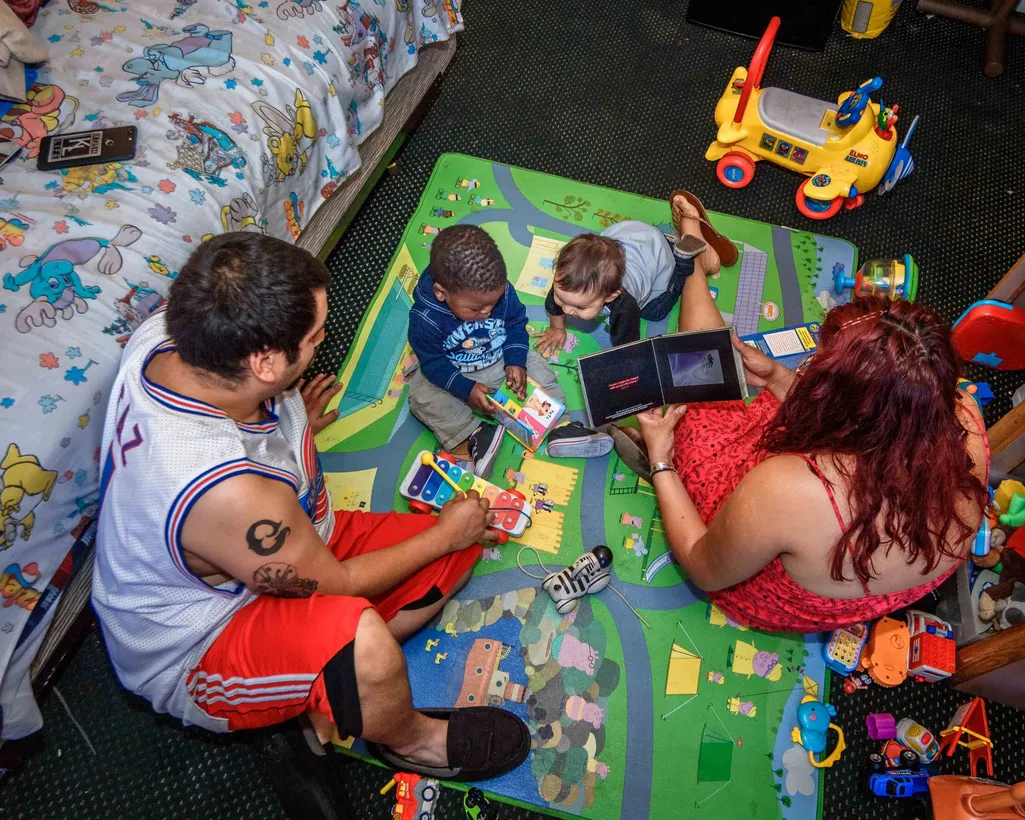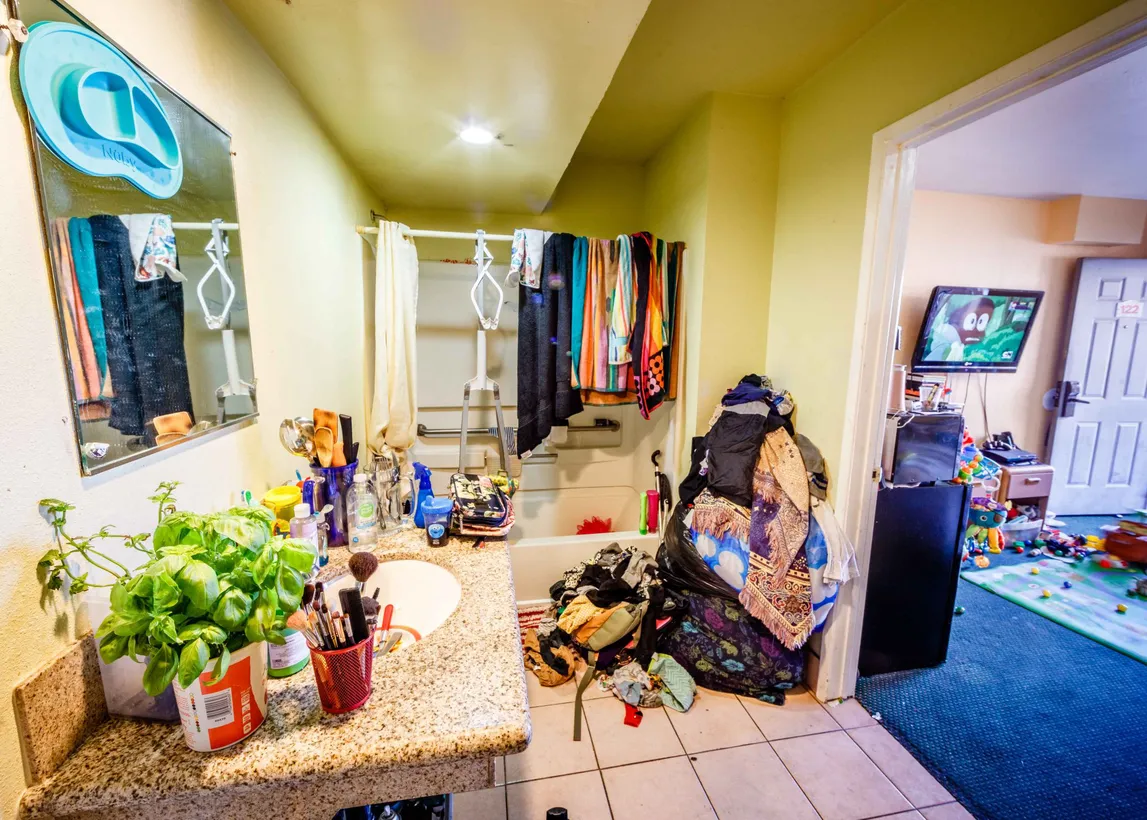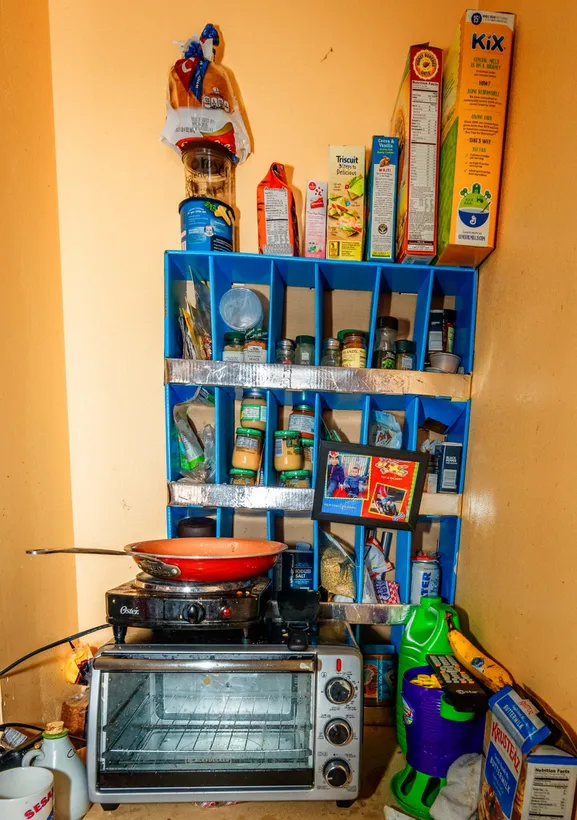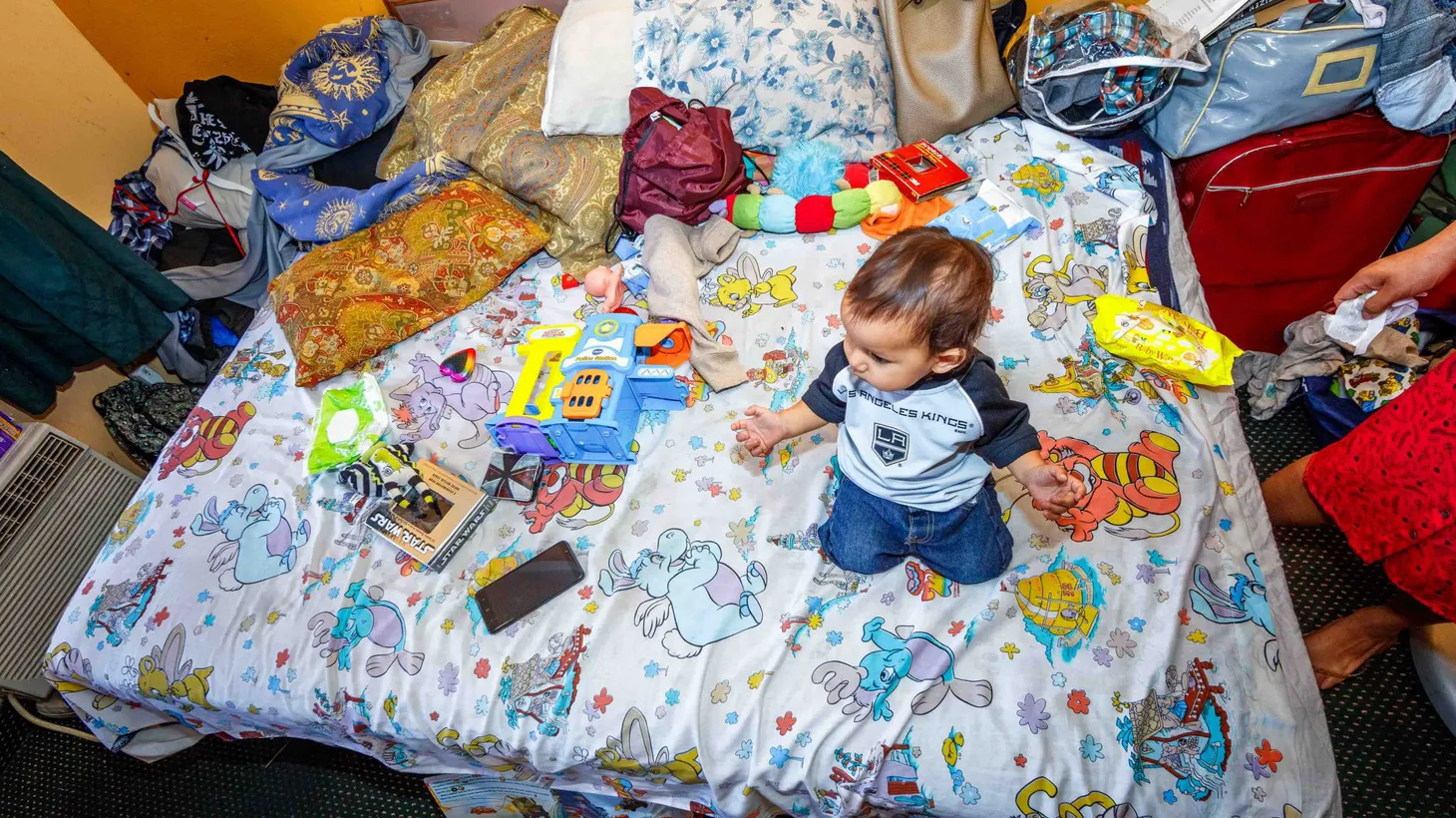
Each morning, as the palm trees hovering above sway ever so slightly, Sophia Diaz and Jose Ramirez roll out a large play mat for their one-year-old Logan. They currently reside in a tiny room at the aptly named Palm Tree Motel. The brightly colored mat covers the dirt they suspect is burrowed deep in the carpet.
Ramirez, 30, is a cook, and he worked three jobs “at fancy burger spots in Hollywood,” while Diaz, 23, was in school, studying early childhood education. They lived a quiet life in a cottage they rented behind a house in North Hills. When their son, Logan, was born in May 2017, life felt complete, Diaz said.
That all changed when their landlord told them the house had been sold and that they’d have to leave. Ramirez and Diaz were hurtled into looking for a new apartment. They had a steady income, $5,000 in savings, and didn’t think finding a place to live would be hard.
According to the most recent homeless count, the number of people experiencing homelessness for the first time grew substantially this year, up 16 percent since the year before. Organizations that serve the homeless have noticed the increase too, and when Diaz and Ramirez exhausted their savings on motel rooms while they searched for a new home, they landed on the doorstep of LA Family Housing.
Ramirez imagined they would be placed in a homeless shelter, something he would have to grudgingly accept for his young family. But the shelters were full and they were placed in a motel — the Palm Tree Inn — for 28 days. Months later, and after dozens more unsuccessful attempts to find permanent housing, the family still lives at the motel.
It is far from where they imagined Logan would spend his first year of life. With no other options, Ramirez and Diaz said they are determined to make their tiny motel room as homely and baby-friendly as possible.
Using motel vouchers to house the homeless is not a new strategy. Ryan Izell, Chief program officer at Union Station Homeless Services, said social service agencies have long placed families in motels when shelter beds are unavailable. Homeless service organizations screen families to make sure they have no other options and then they provide them with a voucher for a motel. Sometimes for a night or two, maybe a week, or at most for 28 days.
As the high level of homelessness persists, motels are being used more than ever before. And as the search for affordable housing gets harder, the motel stays get longer.
“Motels are really meant to be a short term intervention while we’re focusing on longer term solutions,” Izell said.
This year’s homeless count found three quarters of the 53,000 homeless people remain unsheltered. City and county leaders are building permanent housing — a long term solution — while looking for emergency measures like building temporary tent shelters. They also recently passed a law to make it easier to convert motels into homeless shelters.
There is also money available that comes from voter approved measures in recent years to provide funds to help house the homeless. Some of that is going to organizations like Izell’s to fund vouchers for short-term stays in motels.
“We have quite a bit of new funding where we can now assist families with ensuring that they are off the streets,” Izell said. And with around 400 motels sprinkled all over the city of LA, there could be a plentiful stock of beds to choose from.
Yet just having more money for motel vouchers doesn’t mean motel owners want homeless families filling all their rooms. Social service organizations have to build relationships with motel owners, according to Stephanie Moran of LA Family Housing. She’s the one who makes the calls to motel owners when they need to place a family.
“The [motel owners] that we work with have become familiar with our families and the families that we serve and homelessness in general, so they very much, I think, are empathetic and understanding of who we place and who we serve,” Moran said.
However, Moran said that there will be more work to do as the program grows. “It’s going to be a lot more informative and educational experience that [motel owners] will need to go through to in order to understand who we are serving.”
For every motel owner who agrees to accept a voucher from a homeless family, there are multiple motel owners that refuse. And that means service providers can’t be too picky. The motels that do accept vouchers can be poorly maintained, rent by the hour, or even be dangerous.
“These motels are open to the general public, they can rent to a walk-in, anybody coming in. And we don’t know what that activity looks like and having children exposed to that can be very, very concerning,” Moran said.
LA Family Housing has an intensive on-site presence at the motels where they place families. “Case managers are visiting families at the motels, checking in, making sure that the children are safe, the family is safe throughout their time there,” Moran said.
Jose Ramirez constantly worries about the safety of his one-year-old, Logan. “There was one incident where we were here and there was like six, seven officers armed around the corner and they came in tactically and went upstairs into one of the rooms and ejected somebody,” Ramirez said. “Just to have that kind of situation going on right in front of where you live, especially with kids in here, not knowing if a person is armed or not armed, It’s crazy. It’s crazy,” he said.


As the days tick by, and more housing applications are denied, they are still living in the motel room. Every 28 days they have to move out for 24 hours, and then they can come back. If a person lives in a motel for longer than 28 days they may get tenants rights, and motel owners don’t want this.
So every 28 days, for the last four months Ramirez and Diaz break down their kitchen pantry, their herb garden, their toddler play zone, and pack everything into their truck for a night. Twenty-four hours later they return, unload, and set it all up again.
Will they one day tell Logan that he spent his first year of life, homeless in a motel?
“Yeah, we’ll let him know that he had it rough and it’s what made him the person he is,” Ramirez said.
This story was produced with support from the Conrad N. Hilton Foundation.


